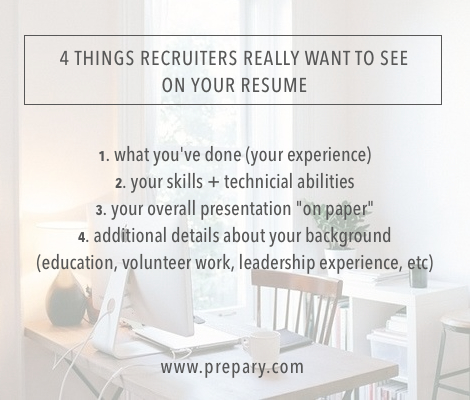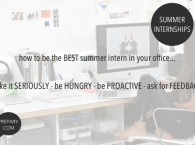Oh the resume… that document that sits idle 90% of the time and collects dust, until you need it (usually right away!) Have you ever picked up your resume after ignoring it for a few years and not known where to start? I have.
I’ve also sat on the other side of the table and screened (and yes, judged) resumes of others. I’ve seen amazing ones that got me very excited to reach out.
There’s a lot of advice out there about resumes – what catchy headlines to use, what buzzwords you need to insert, how it should be designed… but a lot if it is just noise. At the end of the day, recruiters take under 30 seconds to screen a resume and at a quick glance, they’re really looking out for a few main things:

Your work experience – what you’ve done & if it’s relevant
This one came first because it’s the most important. Actual experience – the companies you’ve worked for and what you’ve done for them – trumps almost anything else. Why? Because recruiters (and hiring managers) want you to be able to come into the company and hit the ground running. This is especially true if you’re interviewing for your 2nd or 3rd job.
When you write about your past jobs, be sure to not just include what your responsibilities were but also what you accomplished (think: results). You can actually use the STAR method to guide you as you write your bullets.
For entry level jobs, work experience is substituted with internships, classes taken, group projects worked on, clubs joined, and anything else that will help you be more qualified for your first job.
Your skills – do you have the technical abilities to do the job/use the programs required?
Most jobs require certain skills and expertise that not everyone has. Whether it’s being bilingual or knowing how to use photoshop, these are things recruiters will quickly hone in on.
The more “technical” the job, the more likely that not having a specific skill will be a dealbreaker. Even if you’ve used a program a few times, it may still be worth it to include on your resume as long as you clarify your level. Someone who has a few things to learn will be a more attractive candidate than someone who doesn’t have the skill at all.
Your ability to professionally present yourself “on paper”
For most roles, you do not need a fully designed, infographic-like resume. However, you do need to be able to present yourself well on a piece of paper. That means a nicely formatted, easy-to-read, error-free resume. If you have amazing graphic design skills or a great template, by all means make something cool (as long as you’re not sacrificing actual content). Just know, if it’s not really well done it won’t wow the recruiter and may even have the opposite effect.
Whether it’s putting together a PowerPoint or crafting an email to go out to a few hundred people, most jobs require presentation skills of some sort. Your resume is really the first indication of those skills so get it right, make it professional, and don’t worry about going overboard on the creativity (unless of course, you’re going into a creative profession).
Other details of your background – educational, extracurricular, etc.
The resume is also a place to list any other important pieces of your background. A recruiter will scan your resume and also take note of your education details, extracurricular activities, volunteer work, leadership experiences, etc. Again, if you are earlier on in your career there will be more focus on things like education whereas if you’ve been working for 10 years, the focus will be on the experience built up and positions held.
Of course in any document there are hundreds of little things that matter so I’m not saying that there aren’t other things you can do on your resume that a recruiter will notice or be impressed by. However, at the core of it, recruiters take very little time to look through a resume and these 4 things are going to matter the most.
Do you need help with your resume and want an expert opinion? Happy to help!
Some other things you’re probably wondering about resumes: Should you send a hard copy of your resume? + Why people say your resume should be on one page





